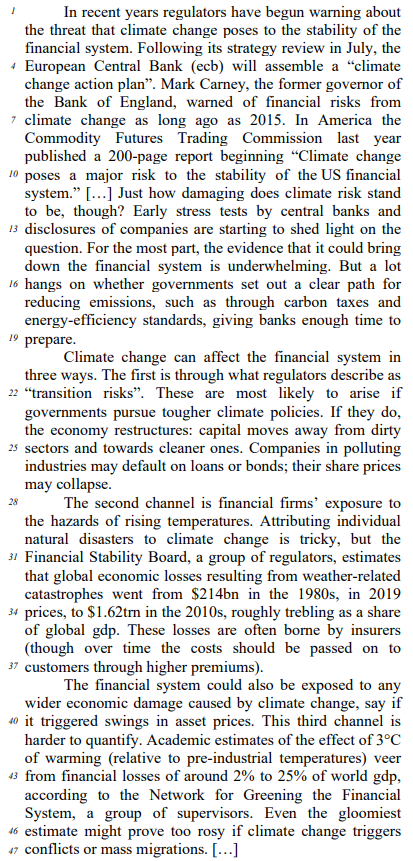Questões de Concurso Comentadas por alunos sobre interpretação de texto | reading comprehension em inglês
Foram encontradas 6.195 questões
Resolva questões gratuitamente!
Junte-se a mais de 4 milhões de concurseiros!
Giving Blood = Giving Life
Giving blood is an amazing thing a person can do. Why? Because people who have anaemia, cancer, blood disorders, sickle cell, and other illnesses need blood transfusion. Some people even need regular blood transfusion to live.
Think about it: giving blood as part ............ everyone’s life; something they done .............. a regular basis, like eating ........... a favourite restaurant. What kind of difference does that make? Well, a donation might make the difference between life and death for nearly five million people who receive blood transfusions every year.
Giving blood is simple and convenient. It only takes about an hour and you can make the donation at a donor center. Afterwards, you will feel good about yourself.
Most people don’t think they’ll never need a blood transfusion, but many do. Blood is something money can’t buy. One may give a newborn, a child, a mother or a father, a brother, or a sister another chance at life. In fact, this simple action may help to save lives.
The blood donation process is much quicker and easier than you think. Giving blood will not decrease your strength and it’s certainly the right thing to do.
Identify the sentences below as true ( T ) or false ( F ), according to the text.
( ) The words quicker and easier, are examples of a comparative form of the adjective.
( ) lives is the the plural form of live.
( ) In the sentence “It only takes about an hour and you can”, the underlined word is in the third person of the simple present tense.
( ) amazing means to astonishing.
Check the alternative which presents the correct sequence, from top to bottom.
Leia o texto para responder às questões de números 47 a 50.
We commonly observe in second language learners a plethora of errors attributable to the negative transfer of the native language to the target language. There can be interlingual interference at the phonological, syntactic, lexical, and semantic levels of language. For example, one might find a beginner learner who says “I am in New York since January”. Examples of distinctions at the lexical level may be seen in false cognates.
The early stages of second language learning are characterized by a predominance of interference (interlingual transfer), but once learners have begun to acquire parts of the new system, more and more intralingual transfer – generalization within the target language – is manifested. Negative intralingual transfer or overgeneralization is seen in such utterances as “Does John can sing?” or “He goed”.
A number of different categories for description of errors have been identified in research on learner language, among them:
I. The most generalized errors of addition, omission, substitution, and ordering. In English, for example, a definite article can be omitted (I went to movie), or an item substituted (/ lost my road), or a word order confused (I to the store went).
II. Within each category, levels of language can be considered: phonology or orthography, lexicon, grammar, and discourse. Often, of course, it is difficult to distinguish different levels of errors. A word with a faulty pronunciation, for example, might hide a syntactic or lexical error.
III. Errors may also be viewed as either global or local. Global errors hinder communication; they prevent the hearer from comprehending some aspect of the message. Local errors do not prevent the message from being heard, usually because there is only a minor violation of one segment of a sentence.
(BROWN, D. Principles of Language Learning and teaching. Englewood Cliffs, NJ: Prentice Hall Regents, 1994. Adaptado)
Assinale a alternativa em que há um erro decorrente de overgeneralization na construção da pergunta.

According to the text, mark the statements below as right (C) or wrong (E).
The author presents three arguments to explain how
climate change affects the financial system.

According to the text, mark the statements below as right (C) or wrong (E).
Companies may be in debt if a transition risk is taken
into account.